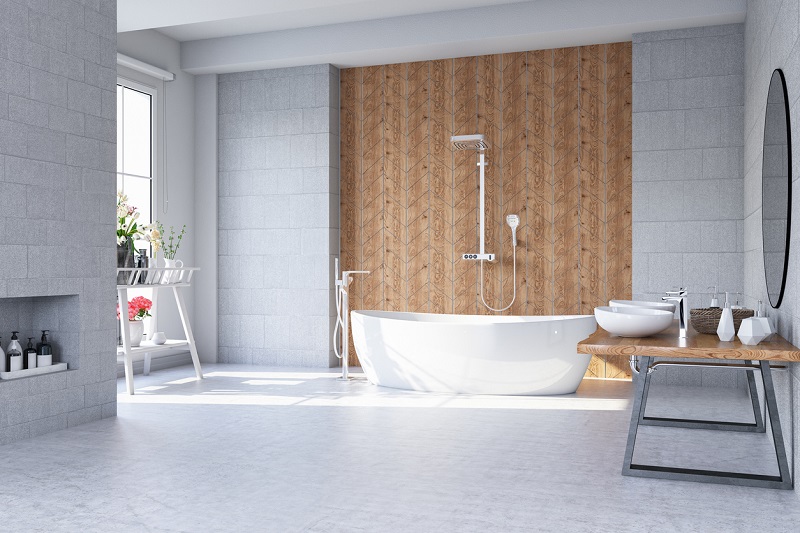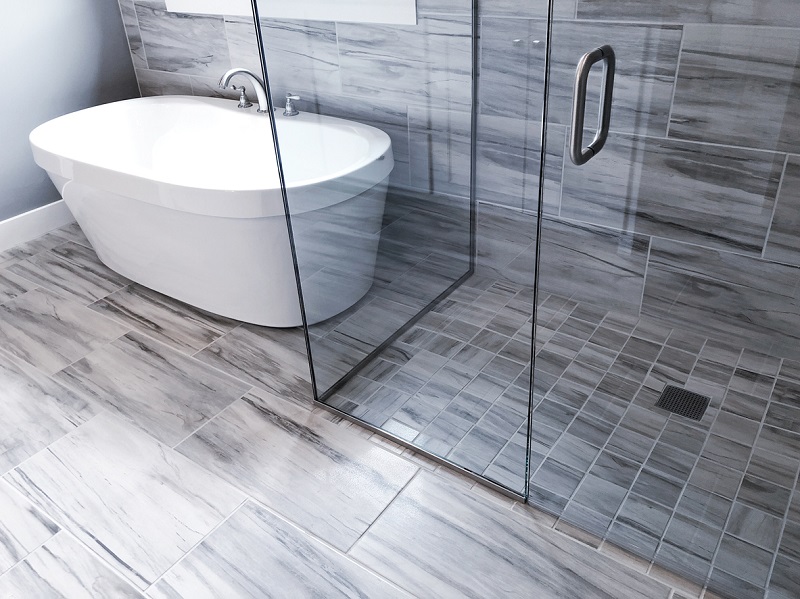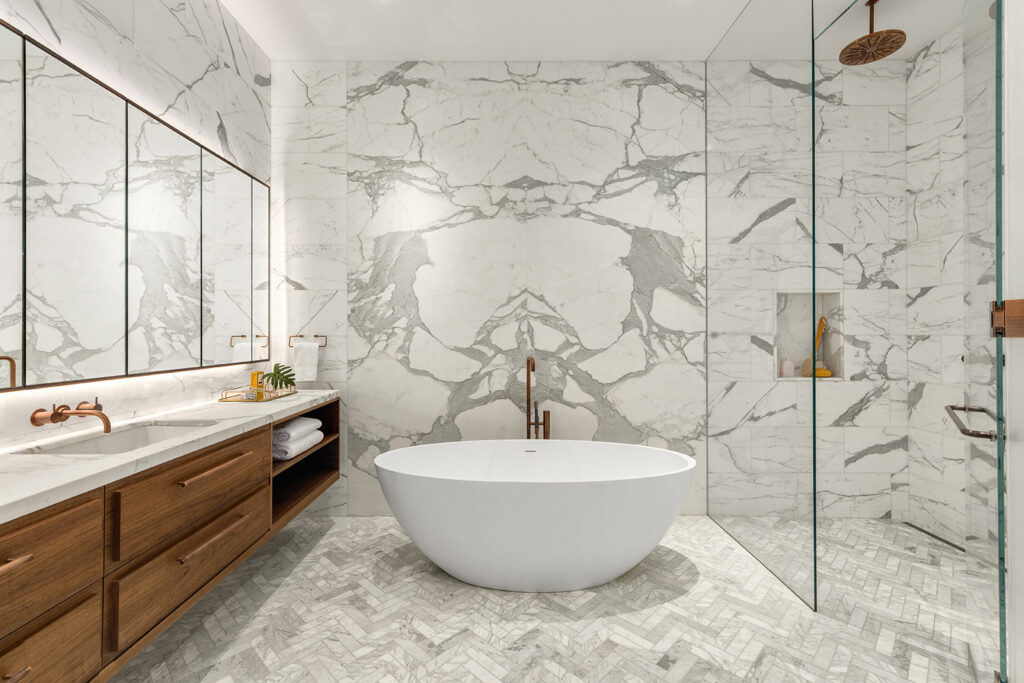
One-Piece vs Two Piece Toilet – Pros and Cons- 2025 Expert Guide
When upgrading your bathroom, one of the most important—and often overlooked—decisions is choosing between a one-piece or two-piece toilet. While
So you are remodeling your bathroom and you don’t know what type of floor you want. With so many on the market, it can be confusing to find the right one. Today, we will look at popular flooring options and their pros and cons to help you choose the right one for your home.
Porcelain and ceramic refer to a tile constructed from the respective materials. These tiles are layered next to each other, then bonded together. Porcelain and ceramic are great choices for bathrooms as the material is water-resistant and resistant to moisture. In addition, the material is also visually attractive as these tiles can come in many colors and even emulate wood.

Pros
Cons
Pros
As its name suggests, natural stone refers to tile constructed from natural stone like granite, marble, and slate. Natural stone is a visually attractive look and is highly resistant to the moisture and humidity of a bathroom. Since the natural stone is mixed into the tile during construction, there are numerous color and style choices to choose from.
Cons
Waterproof vinyl is constructed from a mixture of wood and plastic. This makes the material very flexible yet durable, with the versatility to be installed almost anywhere that you want. It is also available in a multitude of styles and look and can simulate the look of high-end wood or natural stone at a fraction of the price. However, since the mixture is wood and plastic, it’s longevity is fairly short and it may emit VOCs.
Pros
Cons
Bamboo flooring is constructed from bamboo that is cut down into strips, dried then machined into flooring planks. It is available in a wide variety of styles, colors, and finishes. For all intents and purposes, bamboo shares similar qualities to hardwood, in that it provides a visually arresting and interesting material, but water can damage it over time.
Pros
Cons
Similar to other types of tile, concrete provides a durable and stronger material than both ceramic and porcelain. It is highly resistant to moisture and heat and it is very easy to clean and maintain. Similar to ceramic and porcelain tile, they come in a large variety and can fit just about any home.
Pros
Cons
Engineered hardwood is similar to hardwood, but with multiple layers of veneer on top to protect the wood beneath. This material is ideal for those that want the look and feel of hardwood throughout their home, but wants a material that is still durable compared to hardwood. That being said, this material can be quite expensive, even more so than hardwood, so be prepared to pay for the visual flair of having hardwood floors in your bathroom.
Pros
Cons
Cork flooring is made from cork oak tree bark which is then processed into sheets and baked in a kiln. The result is eco-friendly flooring that is easy to install and easy to clean. It remains a popular choice in many homes because it is very warm and comfortable to walk on.
Pros
Cons
Now that you have seen what materials you should consider, here are some materials you should avoid for your bathroom.

Carpet is comprised of a fabric that is woven into a textile floor pattern. Typically, these fabrics range from animal wool to synthetic fibers such as polypropylene, nylon or polyester. Carpet is terrible for bathrooms as fabrics will absorb humidity and moisture, leading to mold or unpleasant smells. For bathroom carpets, this is fine, since you can remove the carpet from the bathroom to dry. If it’s the flooring, this becomes more problematic, because you can’t easily dry it.
Cons
Hardwood is wood from dicot trees that grow in a tropical forest. This wood is then sanded down and constructed into planks for floor usage. The wood is typically dense and more durable than other wood types, namely softwood. Hardwood has grown in popularity for many bathroom installations due to it’s aesthetic, but it is strongly advised that you don’t use hardwood in your bathroom. This is because, hardwood reacts to the heavy moisture and humidity of your bathroom, leading to warping and rot down the line. In addition, hardwood cannot handle the chemical cleaners of most bathrooms and will stain quite easily.
Con
Laminate flooring is constructed from a multi-layer synthetic flooring product that is fused together with a lamination process, usually fiberboard and resin. Since it’s a synthetic wood, it does not carry any of the durability benefits of natural wood, in fact, it’s much worse. Laminate flooring can attract moisture and over time, if the moisture is not dealt with, the flooring can rot or create mold.
Cons
Linoleum is a floor covering made from pine resin, sawdust, cork dust, linseed oil, and mineral fillers. Linoleum floor is a popular choice for many homeowners because it strikes a fair balance between the high and low ends of materials. The biggest drawback to linoleum is that it is susceptible to moisture and the humidity will greatly exacerbate this issue.
Cons
If the materials above do not appeal to you, here is another option you should consider.
Rubber-based flooring is made from synthetic material such as recycled tires and tree rubber which is then formed into a flooring material. The advantage of rubber-based flooring is that it is naturally water-resistant, comes in many style choices, and can be fitted into any space.
Pros
Cons
Below are some elements you should consider before choosing flooring for your bathroom. With these considerations in mind, you will easily choose the right fit for your home.
Flooring is expensive, and the right material will ultimately depend on your personal budget and the cost of the materials themselves. If you fail to follow your budget, you can easily overspend or run out of money for other aspects of your bathroom remodel. A budget will ultimately provide guidelines for how you spend your resources and plan out your bathroom. Often times, you will need to compromise on materials to suit your budget and this can be useful in terms of making you more decisive in building decisions. For example, rock/tile options may seem attractive, but they are generally much more expensive than wood or synthetic material. By installing a cheaper material, you have more funds for other flourishes in the bathroom or fixtures such as a higher quality sink or bathtub.
Bathrooms naturally create a damp or moist environment through general use. This moisture may appear harmless on it’s own, but can easily lead to mold and mildew if untreated. The type of flooring will determine how much bathroom moisture will affect you. If you choose a wood-based floor material, you will need to replace your floorboards regularly as they will warp and deteriorate if exposed to excess moisture. Synthetic wood materials fare much better than hardwood, but you should consider the ventilation of your bathroom carefully and ensure that no excess moisture remains after use.
Your available bathroom size will play a large part in determining what flooring options are available to you. While it may seem attractive to have a larger space, a large bathroom will require more floor material to complete the job. Additionally, you will need to account for any large fixtures such as a freestanding bathtub, so your floor will need to be durable. Similar to your budget, your bathroom size can help to determine what kind of material will fit into your budget. If you don’t factor in your bathroom’s size before construction, you can easily go over budget and open up your bathroom to further damages down the road.
How much traffic your bathroom will see will determine how much time and energy you want to place on a specific bathroom. If a bathroom isn’t really going to be used and exists more as an ornamental facet in your home, you can pay less attention to durable material and simply create a more aesthetically pleasing space.
Not considering bathroom traffic can result in a bathroom that is quite expensive in terms of furnishing and flooring, but sees little use, ultimately making the bathroom less worthwhile. An example of this would be a hall bathroom that sees heavy traffic from all users in the house when compared to a guest bathroom in a guest room that sees very little traffic. In this case, you should prioritize the bathroom that sees heavy traffic and work to make it more durable for heavy use.
The finish your flooring takes will greatly impact its durability throughout its use. In addition to providing an aesthetically pleasing shine, the finish you choose will ultimately protect your floor from harmful elements such as water. If you don’t choose a correct finish or even finish your floor at all, you leave your floor open to exposure to the elements which could damage it.
Your bathroom’s floor is durable and aesthetically vibrant to all your guests, but it doesn’t feel great to walk on with your bare feet. Although it may seem like an afterthought, the texture of your bathroom floor is crucial to the longevity of your bathroom. After all, if your bathroom isn’t comfortable to use, what’s the point? By not comparing and contrasting what floor texture feels best to you, you may end up with a very expensive bathroom that no one uses due to the texture of the floor.
Does your bathroom floor mesh with the overall design and theme of your bathroom? This is of course subjective, but if you have a specific theme or design you have in mind, it is best to choose a material that matches with it. If your bathroom already has tile in place, install tile for the floor. Alternatively, if you have a more rustic bathroom feel, stick to a wood-based floor to continue the aesthetic. Always create a bathroom design ahead of time so that you can reference it during construction.
Now with many of the logistical aspects out of the way, where can you find bathroom flooring to feel and test out? Below are some of the common places you may find bathroom flooring.
Stores such as Lowes and Home depot provide a broad range of bathroom floor options. They carry porcelain, ceramic, glass, vinyl, laminate, hardwood, marble, stone tile, and almost every type of flooring available. The advantage of shopping at these stores is that you get to see and touch the material in person before purchasing. In addition, they usually provide a contractor with a guarantee that will install the tile for you at a reasonable price.
Pros
Cons
Online stores will generally find a source for all tile types and sell the product to you. Since there is no middle man, and they don’t need to fund employees or a large store, the cost is significantly lowered. This process ends up being the cheapest way to buy tile in as you can go to an online vendor and purchase whatever material you want. The drawback to online retailers is that you need to be informed about exactly everything you want/need. Additionally, there is no contractor or installation service through these stores so you need to hire someone or DIY. This resource is best for those who want to DIY their home installation as there is very little that isn’t done by you.
Pros
Cons
Local bathroom stores are generally stocked with incredibly knowledgeable individuals that can provide a great resource to you. These stores are ideal for those who have little idea of what they want and just want advice and opinions on bathroom flooring. Their prices will tend to be the highest when compared to big-box and online stores, but the service they provide is generally worth the money. Local stores are great for first-time or inexperienced homeowners.
Pros
Cons
When choosing a bathroom floor, you want to choose a water-resistant material that absolutely won’t track water. The added moisture can create a large headache for you in the future, so while it may seem quite costly at first, consider the floor as the foundation of your bathroom. You can reduce costs elsewhere, but you should definitely choose a higher-quality material that will save you more money in the long term.

Eric is the founder and president of Badeloft USA. He has been the president of Badeloft’s US division for over ten years and oversees all marketing and branding aspects of Badeloftusa.com.
His expertise lies in small business development, sales, and home and bathroom industry trends and information.
Contact us with any business related inquiries.

Free material samples and tub templates

When upgrading your bathroom, one of the most important—and often overlooked—decisions is choosing between a one-piece or two-piece toilet. While

Small details, including what you place on the floor, can make a big difference when setting up or upgrading your

Plumbing traps may seem like small components, but they are critical in keeping your home safe and odor-free. Two of
When shopping for new bath linens, the difference between a bath towel and a bath sheet can feel subtle, but
Request your free material sample below. By submitting, you agree to receive occasional product updates and offers from Badeloft. Unsubscribe anytime.
"*" indicates required fields
"*" indicates required fields
"*" indicates required fields